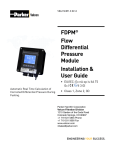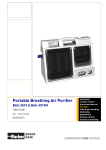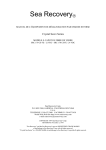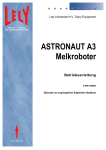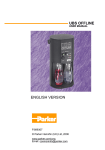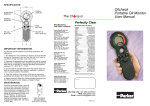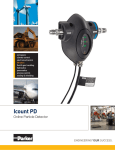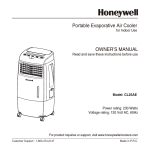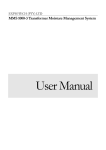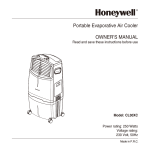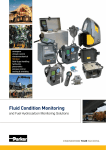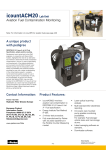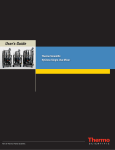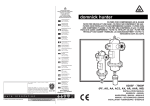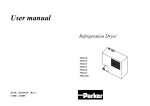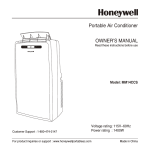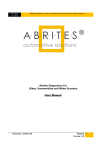Download Sentinel™
Transcript
Sentinel ™ Portable Purification System User’s Manual Sentinel | User’s Manual ™ Preface This Manual informs the installer and operator about the safe installation, operation and everyday maintenance of the Sentinel Oil Purification System (further to be abbreviated as Sentinel). Always keep this Manual near the Sentinel. Read this Manual carefully before putting the Sentinel into use or before carrying out any operation. Only then can optimal safety be obtained. 1 Sentinel | User’s Manual ™ Contents Preface...................................................................... 1 4 Operation Contents................................................................... 2 4.2 Preparing for Use............................................. 10 1 Introduction 4.3Starting ............................................................ 11 1.1Warning.............................................................. 3 1.2Manufacturer...................................................... 3 4.3.2 Starting.................................................... 11 4.1Safety .............................................................. 10 4.3.1 Initial Start Up.......................................... 11 1.2.1 Introduction Parker Hannifin...................... 3 4.4 Screen Option.................................................. 12 1.2.2 Partnership................................................ 3 4.5 Set-Up Screen.................................................. 12 1.3 Related Documents............................................ 3 4.6 Adjusting Set Points......................................... 13 1.4Machine-Identification........................................ 3 4.7 Removing from Service.................................... 13 1.5 Applicable Legislation........................................ 3 1.6Copyright............................................................ 4 5 Transport & Storage 1.7Liability............................................................... 4 5.1 Safety Precautions........................................... 14 1.8Responsibility..................................................... 4 5.2 Transport (rolling).............................................. 14 5.3 Transport (lifting)............................................... 14 2 Safety 5.4 Transport (fork lift)............................................. 14 2.1 Safety and Precautionary Symbols.................... 5 5.5Storage............................................................. 15 2.2 Warning Pictorials............................................... 5 2.3 Operator............................................................. 5 6 Maintenance 2.4 Engineer............................................................. 5 6.1 Safety precautions............................................ 15 2.5 General............................................................... 6 6.2Inspections....................................................... 16 6.2.1 Daily Inspections..................................... 16 6.2.2 Weekly inspections.................................. 16 3 Machine description 6.2.3 Yearly inspections.................................... 16 3.1 Introduction........................................................ 7 3.2Function.............................................................. 7 2.5.1 Hazardous Materials.................................. 6 6.3Maintenance..................................................... 16 7 Disposal 3.2.1 Running modes......................................... 7 3.3 Process Description........................................... 7 7.1 Safety precautions............................................ 17 3.3.1 Air Flow...................................................... 8 7.2 Disposing of the Sentinel................................. 17 3.3.2 Oil Flow...................................................... 8 7.3 Environmental aspects..................................... 17 3.3.3 Water Flow................................................ 8 3.4Controls.............................................................. 8 3.5 Hose Connections.............................................. 8 3.6 User adjustable Set Points................................. 9 8 Parts List................................................................... 17 9 Troubleshooting.......................................................... 18 3.6.1 Moisture Level........................................... 9 3.6.2 Temperature.............................................. 9 Appendix 1 3.6.4 Sample Rate.............................................. 9 Technical Specifications ........................................ 21 Appendix 2 2 Test Specifications.................................................. 22 Sentinel | User’s Manual ™ 1 Introduction This chapter gives basic information about the Sentinel and the accompanying operations and maintenance instructions. 1.1 Warning Only qualified personnel are allowed to install, operate and maintain the Sentinel. Safety is only ensured when you read this manual carefully before putting the Sentinel into use or before carrying out any operation. 1.2 Manufacturer The Sentinel is manufactured by: Parker Hannifin Corporation Hydraulic Filter Division 16810 Fulton County Road #2 Metamora, OH 43450 Phone: 419 644 4311 Fax: 419 644 6205 Internet: www.parker.com/hydraulicfilter 1.2.1 Introduction to Parker Hannifin Parker Hannifin is the world’s leading manufacturer of motion and control technologies and systems, providing precision-engineered solutions for a wide variety of commercial, mobile, industrial and aerospace markets. The company employs approximately 62,000 people in 48 countries around the world. Parker provides quality services and products to our customers through strong, professional distribution and Technology Centers. To meet our customer needs in motion and control, Parker provides the broadest range of products available from any single supplier. This is supported by expertise in nine major technologies: hydraulics, pneumatics, electromechanical, filtration, process control, fluid and gas handling, sealing and shielding, climate control and aerospace. 1.2.2 Partnership At Parker we believe in partnership with our customers so we can provide them with solutions which help achieve higher levels of productivity and profitability by engineering the best systems for their requirements. This means studying customer applications to find new and better ways to create value. Not only a product supplier, Parker also offers Value Added Services to help its customers save time and money. 1.3 Related Documents In addition to this manual the following documents are included: • Bill of Materials • Vacuum Pump Manual • Installation Drawings • Hydraulic & Electric Schematics 1.4 Machine Identification The machine is identified as: the Sentinel. 1.5 Applicable Legislation Not all parts of the Sentinel comply to the directives of the EU. Therefore it is not provided with the CE mark. 3 Sentinel | User’s Manual ™ 1.6 Copyright Copyright Parker Hannifin. All rights reserved. No part of this publication may be reproduced, stored in a database or retrieval system, or publication in any form or in any way, electronically, mechanically, by print, photo print, microfilm or any other means without prior written permission from the manufacturer. 1.7 Limitation of Liability UPON NOTIFICATION, SELLER WILL, AT ITS OPTION, REPAIR OR REPLACE A DEFECTIVE PRODUCT, OR REFUND THE PURCHASE PRICE. IN NO EVENT SHALL SELLER BE LIABLE TO BUYER FOR ANY SPECIAL, INDIRECT, INCIDENTAL OR CONSEQUENTIAL DAMAGES ARISING OUT OF, OR AS THE RESULT OF, THE SALE, DELIVERY, NON-DELIVERY, SERVICING, USE OR LOSS OF USE OF THE PRODUCTS OR ANY PART THEREOF, OR FOR ANY CHARGES OR EXPENSES OF ANY NATURE INCURRED WITHOUT SELLER’S WRITTEN CONSENT, EVEN IF SELLER HAS BEEN NEGLIGENT, WHETHER IN CONTRACT, TORT OR OTHER LEGAL THEORY. IN NO EVENT SHALL SELLER’S LIABILITY UNDER ANY CLAIM MADE BY BUYER EXCEED THE PURCHASE PRICE OF THE PRODUCTS. • Neglecting warnings or prescriptions as shown on the Sentinel or stated in this manual. • The use of the Sentinel for other applications or under other circumstances than stated in this manual. • Modifying the Sentinel in any way. This includes the application of other spare parts and/or changing the control program. • Insufficient maintenance. 1.8 User’s Responsibility The user, through its own analysis and testing, is solely responsible for making the final selection of the system and Product and assuring that all performance, endurance, maintenance, safety and warning requirements of the application are met. The user must analyze all aspects of the application and follow applicable industry standards and Product information. If Seller provides Product or system options, the user is responsible for determining that such data and specifications are suitable and sufficient for all applications and reasonably foreseeable uses of the Products or systems. 4 Sentinel | User’s Manual ™ 2 Safety This chapter describes the safety precautions with regard to the Sentinel. The safety precautions in this manual should be respected. Deviation from the precautions can cause unacceptable risks. 2.1 Safety and Precautionary Symbols Suggestion to carry out tasks easier. Draws attention to potential problems. Draws attention to damage to the Sentinel if the instructions are not carried out carefully. Draws attention to serious injuries to the operator if the instructions are not carried out carefully. 2.2 Warning Pictorials There are no warning pictorials attached to the Sentinel. 2.3 Operator Only qualified operators should operate the Sentinel. The operator has to be informed of chapters 1 through 6 of this manual before carrying out any operations on the Sentinel. While operating the Sentinel, the following Personal Protective Equipment (PPE) must be worn: • protective clothing • work shoes • safety glasses 2.4 Engineer All maintenance and installation activities are reserved for specially trained engineers. The engineer has to be informed of the entire contents of this manual before carrying out any maintenance on the Sentinel. While performing maintenance on the Sentinel, the following Personal Protective Equipment (PPE) must be worn: • protective clothing • work shoes • safety glasses Figure 2.3 & 2.4: PPEs to be worn 5 Sentinel | User’s Manual ™ 2.5 General The Sentinel can be operated and maintained safely if all safety precautions are observed; however, dangerous situations can occur due to poor judgement or negligent use. Always stay alert for dangerous situations. Observe the following general precautions: • Pay attention to loose clothing and hair. • Keep your hands away from dangerous zones. • Check the functionality of the Sentinel daily. • Do not turn on the main switch if persons are in contact with the machine. • Unplug before performing maintenance activities. • Replace damaged or defective parts before putting the machine into service. • Modifications to the machine without prior approval of the manufacturer are not permitted. • Never disassemble piping lines or components while under pressure. The Sentinel is a powerful tool that supplies hydraulic fluid under high pressure. Be careful when using it. In case of unexpected leakage: • Immediately stop the complete system. • Protect yourself (face, hands, etc.) against spraying liquid. • Never try to stop the leak flow by covering it with your hands. • Use absorbing paper to prevent fluid from entering the environment. • Properly dispose of all spilled fluids. 2.5.1 Oil Contaminated with Hazardous Materials If there is any possibility the oil being purified contains a solvent or materials which could be considered hazardous, either with toxicant or flammable explosives, the Sentinel should not be used. The Sentinel should never be used to remove volatile’s such as: diesel fuel, gasoline or other products with low flash points, explosive in nature, or toxic. For clarification, consult your factory representative for detailed information. 6 Sentinel | User’s Manual ™ 3 Machine Description This chapter describes the function, the major components, and the operation of the Sentinel. 3.1 Introduction Parker Hannifin is responsible for the engineering and delivery of the Sentinel. 3.2 Function Dehydration and purification of hydraulic fluid. The Sentinel is not permitted for any other purposes than those stated above. 3.2.1 Running Modes There are three modes of operation for the Sentinel. • Standard mode: Once started, the machine runs continuously until the moisture level reaches the set point. When set point is achieved, the Sentinel will automatically shut down. • Sentinel mode: Once started, the machine will power up and sample the oil. If the sample is above the high moisture level set point, the machine remains on until the lower moisture level set point is reached. The Sentinel will remain off until the high level set point is reached again. • Batch mode: Once started, the machine runs one batch to the moisture level set point before discharging. New batches are pulled in until the the inlet moisture is below the set point. 3.3 Process Description The figure below is a schematic representation of the Sentinel. The technical specifications can be found in Appendix 1 - ‘Technical specifications’. 7 Sentinel | User’s Manual ™ 3.3.1 Air Flow Air moves through the unit as a result of the vacuum pump. Atmospheric air enters through a desiccant breather, flows through a needle valve, into the vacuum chamber where the mass transfer of water takes place. The saturated air then exhausts through a coalescing element, to eliminate any oil mist, before traveling through the vacuum pump. Finally, the air is exhausted through the condensate tank where the free water falls out. 3.3.2 Oil Flow Oil enters the back of the unit through the inlet port. The inlet control valve is energized during the filling cycle. Once through the heater tube, the oil enters a diffuser where the maximum surface area is exposed while minimizing oil carry over. At this point in the cycle, any water in the oil is flashed off and enters the drier air above. The oil then falls into the sump where it is circulated back through the heater tube and vacuum chamber until the temperature set point is reached. Once the temperature set point is reached the oil circulates in the chamber for a period that optimizes the water removal rate and energy usage. At the end of this period, the oil is returned via the return port on the back of the unit. 3.3.3 Water Flow Water in the oil is transferred to the air where it is exhausted and trapped in the condensate tank. Roughly 20% of the water is retained and 80% is exhausted via the exhaust port on the rear of the unit. 3.4 Controls The controls for the Sentinel are located across the top of the unit as shown. See chapter 4 “Operation” on how to use the control panel. B A A. The main power switch provides power to the unit. C B. The IQAN, a PLC control screen, is used to operate all functions of the machine. C. The phase selector is used when the IQAN screen displays a phase fail fault. In this instance the phase selector must be switched for proper operation. 2 3.5 Hose Connections 3 1. Hydraulic Outlet 2. Vacuum Exhaust 1 3. Hydraulic Inlet 4. Water Drain 4 8 Sentinel | User’s Manual ™ 3.6 User Adjustable Set Points The following settings are adjustable within the IQAN: • Moisture high limit • Sample rate • Moisture set point (low limit) • Temperature • Unit selector 3.6.1 Moisture Level The oil moisture level is measured by a relative humidity sensor and is reported as a percentage. When saturation is 100%, the oil contains the maximum amount of water that can be dissolved in the oil (any excess seen is free water). The low moisture level is the lowest level that is desired. This is determined by the application and oil in use. The lower the set point, the longer the Sentinel takes to reach this moisture level of saturation. The high moisture level is the point at which the Sentinel mode of operation will stay on. This combination creates an acceptable window of moisture below saturation. The default low moisture level is 25% of saturation; The default high moisture level is 75% of saturation. The maximum amount of water that is dissolved is dependent on the temperature and the type of oil. The moisture level should always be maintained below saturation at all time to avoid system damage. 3.6.2 Temperature The temperature set point is the point to which the oil is heated during the dehydration process. The default value is 130° F The maximum allowable temperature is oil dependent. Consult the oil specifications to avoid decrease life or damage. 3.6.3 Sample Rate The sample rate is the duration between sampling when the machine is set to Sentinel mode. The default value is 120 minutes. 3.7 Auto Condensate Drain When the auto condensate is selected from the set up screen, see section 4.6, the water collected in the condensate tank will automatically drain when full. If the auto condensate is not selected a manual drain will be required and the Sentinel will shut off when the condensate tank is full. 3.8 Vacuum Purge A vacuum purge cycle runs the vacuum pump while no oil is taken into the Sentinel. This purge cycle is preformed so that any moisture in the vacuum pump is driven out and the integrity of the pump is maintained. Press the left arrow key to cancel the vacuum purge. 3.9 Run Empty The run empty cycle pumps any remaining oil out of the vacuum chamber. 9 Sentinel | User’s Manual ™ 4 Operation This chapter describes the operation of the Sentinel. 4.1 Safety The Sentinel is fitted with fluorocarbon seals. All process fluid must be compatible with fluorocarbon. Contact Parker with fluid compatibility questions. 4.2 Preparing for Use Check that the oil in the vacuum pump is at the proper level before operating. 1. Place the Sentinel on a flat surface 2. Lock the brake on the two front wheels 3. Connect the hoses: a. Hydraulic Outlet b. Hydraulic Inlet c. Water Drain 4. Plug in the power cord 2 Ensure proper ventilation when operating. 2 See the technical specification for proper power requirements. 3b 3a 4 3c 10 Sentinel | User’s Manual ™ 4.3 Starting 3 4.3.1 Initial Start-Up 4 1. Sentinel is shipped with the breakers in the off position and must be turned on to operate. 2. NEMA L16-30P flanged inlet is standard on all units. Cord set (PN 943238) is available to order through Parker. 4 3. Power the system on. 4. If the “Phase Fail Alarm” is shown on the display, change the phase switch position. Press OK, F2. 5. To set the language and to set the date & time, press the menu button, located in the lower right hand corner of the IQAN. Languages can be selected through the main set-up screen. To choose language from the main screen choose preferences, then F3 for languages. 5 6. English or Metric units can be selected see 4.6 Adjust Groups. 4.3.2 Starting 1. Power the system on. 2. If the “Phase Fail Alarm” is shown on the display, change the phase switch position. Press OK, F2. If oil remains in the system a message will be displayed reminding the user to drain the oil before operating. 1 2 2 11 Sentinel | User’s Manual ™ 3 3. Start-up screen. Press F1 to continue. 4. After reading and agreeing to the messages, press F4 to continue. 5. Press F1, F2, or F3 to select the desired operating mode. Pressing the function keys a second time deselects the chosen mode and allows for another selection to be made. 4 6. Press F4 to start the Sentinel. Press a second time to stop. When stopped, the Sentinel will automatically run a purge cycle to ensure the system is empty and that the integrity of the vacuum pump is maintained. 4.4 Screen Option Use the vertical arrow keys to select a screen option. 1. Run screen (default) 2. Gauge screen (see 4.3.2 for function keys use) 3. Set-up screen 6 4.5 Set-Up Screen 1. F1 performs a run empty function should any oil be left in the system. 2. Pressing F2 allows for auto condensate drain to be selected. Pressing and holding F2 drains the condensate tank. 3. F3 performs a vacuum purge function. 4. F4 allows the user to adjust the set points. 5. OK will reset the cycle counter and system timer. 1 12 2 3 4 Sentinel | User’s Manual ™ 4.6 Adjusting Set Points The adjustable set points are: • Moisture high limit • Sample rate • Moisture set point (low limit) • Temperature • Unit Selector Use the arrow buttons to scroll through the options and press the “OK” button when a selection has been made. See Chapter 3 for the set points function Press the escape key (back arrow) to return to the Set-Up Screen 1. Once the adjustable parameter is chosen, use the up and down arrows to adjust to the desired setting, press ok to accept. 2. Press the escape key once to return to the point selection page. 4.7 Removing from Service Make sure the Sentinel has stopped running before taking it out of service. 1. Purge the vacuum pump from the set-up screen by pressing F3. 2. Make sure the oil is emptied from the system by pressing F1 “Run Empty” within the set-up screen. 3. Drain the condensate by pressing and holding F2 within the setup screen. 4. Turn off power via the main switch. 5. Disconnect the power cord from the back of the unit. 6. Disconnect all the hoses from the back of the unit. Pressing the escape key while on the set-up screen, with the Sentinel not running, will open the inlet valve to allow for the heater tube to be drained. Oil may leak from the hoses 13 4 Sentinel | User’s Manual ™ 5 Transportation & Storage This chapter describes how to transport and store the Sentinel. 5.1 Safety Precautions Always check that the Sentinel is completely disconnected before transporting and storing the Sentinel. Do not lay the Sentinel on its side. 1 Never lift or transport a Sentinel that is filled with oil. See Chapter 2 for more information and safety precautions. 5.2 Transport (rolling) 1 1. Disconnect the hoses. 2. Disconnect the power supply. 2 3. Unlock the brake on the two front wheels. 3 The Sentinel can now be freely rolled around. Make sure the brakes are locked again when transportation is done. 3 3 5.3 Transport (lifting) 1. Disconnect the hoses. 2. Disconnect the power supply. 3. Connect the hoisting gear to the four hoisting eyes. Always use all four hoisting eyes when hoisting the Sentinel. See Appendix 1 ‘Technical Specifications’ for information about the weight of the Sentinel. 5.4 Transport (fork lift) 1. Disconnect the hoses. 2. Disconnect the power supply. 3. Insert the forks into the fork pockets from the front. 3 14 Sentinel | User’s Manual ™ 5.4 Storage When storing the Sentinel it must be placed in a room which complies to the following requirements: • • • The room must be dry with a relative humidity of 45-75%. The ambient temperature of the storage area must be between -10 and 40°C for fluid handling components. In case of electronic components the storage temperature should be at least 0°C. The room where the machine or parts are stored must be free from dust otherwise the fluid handling components must be sealed with plastic foil. If the Sentinel is stored for over a year, specific care is needed. Please contact Parker Hannifin in case longer storage is required. Otherwise, warranty may not be valid. 6 Maintenance This chapter describes how to maintain the Sentinel. 6.1 Safety Precautions Only qualified personnel should carry out maintenance procedures on the Sentinel. Make sure the system is switched off completely and the power supply is locked before carrying out any maintenance activities. Make sure the system is completely depressurized before carrying out any maintenance activities. After disconnecting any part, immediately block open ports with clean plugs to prevent dirt from infiltrating the hydraulic system. See Chapter 2 for more information and safety precautions. 15 Sentinel | User’s Manual ™ A Fill Port 6.2 Inspections To ensure proper operation of the system, maintenance must be carried out on a regular basis. 6.2.1 Daily Inspection 2 A Vacuum oil level. 6.2.2 Weekly Inspections Items Inspection Activities 1 System operation Check system operation - no unusual noise and vibrations. 2 Air breather Check the breather. Normal color will be blue. If the color is pink, the desiccant is saturated with moisture and needs to be changed. 3 Oil filters Check the filter element condition indicator. If needed, change the filter element. 6.2.3 Yearly Inspections 3 Only qualified personnel should carry out the yearly inspection. Items Inspection Activities Hoses Check the overall quality of the hoses. 6.3 Maintenance To ensure proper operation of the system maintenance must be carried out on a regular basis. Maintain hydraulic filter according to the ∆P indicator. (PN 936711Q) B Replace all coalescing filters after 300 hours of use. (PN 943237) 3 B 16 Sentinel | User’s Manual ™ 7 Disposal This chapter describes how to dispose of the Sentinel. 7.1 Safety Precautions Switch off the Sentinel completely before disposing of the Sentinel. Always check that the Sentinel is disconnected from its power sources before disposing of the Sentinel. See Chapter 2 for more information and safety precautions. 7.2 Disposing of the Sentinel When disposing of the Sentinel, always consult Parker Hannifin. Only qualified personnel is authorized to dispose of the Sentinel. 7.3 Environmental Aspects Please observe the following environmental aspects: • Dispose of the Sentinel according to the legal and local regulations. • Re-use parts and substances of the Sentinel and process parts and substances in an environmentallyfriendly manner if re-use is impossible. • Discharge harmful, dangerous and possibly contaminated substances (or liquids) according to the legal and local regulations. Make sure the Sentinel is disposed of in a safe way and according to the environmental rules in the country of use. 8 Parts List Part Number Description Part Number Description 00424 Float Switch B-10235-0-230 Heater 230VAC 06F20C2218A1FPH80 Condensate Drain Valve B-10235-0-380 Heater 380VAC 20072409 IQAN MD3 display module B-10235-0-460 Heater 460VAC 2820008 Pressure Sensor CEM3546T Hydraulic Pump Motor 3349116565 Gear Pump MPS-V33N-PGAT Vacuum Sensor 40CN205QEVE2GS164 Filter MS1504 Moisture Sensor 7221GBN51V00N0D300C2 Inlet valve 7221GBN51V00N0D300C2 Recirculation valve For Service Requiring No Yellow Metals 936711Q Hydraulic Particulate Element Part Number Description 943236 Mounting Bracket Kit 945302 943237 Service Kit (includes TriCeptor air breather, hydraulic particulate element, coalescing element, vacuum pump exhaust element, vacuum pump oil) No Yellow Metals Accessory Kit - wetted components only (includes below part numbers) 15U29-00V Inlet Valve 12F22C6148A3FPH80 Recirculation Valve 12F-C12L-1/3-SS Check Valve F800S Flow Control Valve 943238 Cordset (pigtail end) used with 943116 and 943213 only 17 Sentinel | User’s Manual ™ 9 Troubleshooting 9.1 Safety Precautions Always wear the prescribed personal protective equipment while working with the Sentinel. Indicates the alarm will cause an automatic shut down. See Chapter 2 for more information and safety precautions. Alarm Image Problem Cause Solution Unit fails to run from IQAN screen Mode not selected Choose mode of operation before pressing “On/Off”. Phase Fail Are you out of phase? High Sump See “Oil in Sump” warning. Vacuum Overflow See “High Oil Level” warning. High Ambient Temp See “High Ambient Temp” warning. Inlet obstructed or pinched hose Straighten or replace. Check any filtration placed before the Sentinel for blockage. Check all isolation valves. Inlet Valve Check solenoid on the inlet valve to make sure it is functioning. Low vacuum level, should be greater than 22 in/HG (558 mm) Check vacuum pump for proper operation. Check for leaks by shutting off oil inlet valve, closing air inlet valve to vacuum chamber, manually operate unit until vacuum gage reads 25 in/HG, and then stop unit. If vacuum holds for less than 30 sec then a leak is present. If 22 in Hg cannot be achieved and no leak is detected then check the vacuum pump for proper function adjust or replace parts as required. Check needle valve, adjust for altitude. Improper PVS installation, negative head too high for unit Check specification sheet. Maximum negative suction head is 8 ft. (2438 mm). Increase inlet hose diameter and shorten hose length to reduce line pressure loss. Preheat oil to reduce viscosity. Use of quick disconnect on inlet hose. Quick disconnects are not recommended. Replace with standard “full port” valve or increase size of quick disconnect to 1.5 times the diameter of inlet hose or consult factory for other options. Inlet control valve not closing Check inlet control valve for debris caught in the diaphragm. If problem persists, install a suction filter. Middle float switch stuck closed Check float switch in vacuum chamber. Air inlet needle valve closed Check needle valve and adjust if necessary. Low Flow A low flow alarm will be displayed if the Sentinel does not take in fluid at a rate quick enough to operate properly High Oil Level 18 Sentinel | User’s Manual ™ Alarm Image Problem Cause Solution High Sump Alarm Foaming oil in vacuum chamber Be sure intake is full submerged. Some oils will foam under normal operating conditions. Lower vacuum level by opening air bleed valve slowly until vacuum reaches 23 in/HG (584 mm). Lower temperature set point. Further maintenance: If the sump is full a warning screen will be displayed and the light on the gauge screen titled “High Sump” will appear red. 1) Drain sump via the port located on the bottom 2) Change coalescing filter. 3) Check vacuum pump oil. It should be clear if not change oil and replace vacuum pump coalescing filter. 4) Confirm the vacuum chamber overflow switch is functioning by removing the vacuum chamber cover and exercising the float switch, watch for the “Vacuum Chamber Overflow” alarm to be display. If the switch works then oil entered the sump because the Sentinel was placed on its side or the oil was allowed to foam. High inlet moisture Transportation High level float switch failure Check high level switch in vacuum chamber. Condensate tank full Drain condensate tank or turn on automatic drain function. Float switch faulty Check for stuck or broken switch. Repair or replace by removing from the back side of the condensate tank. Excessive pressure on the inlet Restrict inlet line. Oil left in system Run empty before starting. Over Pressure Alarm The pressure in the return line exceeds 60psi Minimize pressure losses in return hose. Maintenance Screen Displayed The Sentinel has exceeded its maintenance timer interval Change filters. High Ambient Temperature Warning High temperature inside cabinet Reset the thermostat, which is located under the top door, by pressing the button in the middle. Other actions include: 1. Remove doors 2. Install fan 3. Insure proper ventilation High Level Condensate Alarm Fast Fill Alarm 19 Sentinel | User’s Manual ™ Alarm Image Problem Cause Solution Filter Alarm Hydraulic filter differential pressure setting is exceeded. Change hydraulic filter. No Alarm Images for the Problems listed below. Problem Cause Solution Unit fails to power up/brown out Improper external power connection, low voltage, low amp service or power supply cord sizing Check input power. Does it match machine specifications? Is the power cord sized right? Make changes as required. Circuit breaker/fuses tripped on main power disconnect or drive motor contacters Reset circuit breakers or replace fuses. If circuit breaker/fuse trips again, check motor for failure. Check supply line voltage for match to units design voltage. Control voltage power failure Check circuit breaker /fuse on control voltage transformer. Reset if necessary. If primary circuit breaker/fuse trips again, transformer has probably failed. Test continuity. Replace if necessary. If secondary circuit breaker / fuse trips again, problem is most likely low voltage in the control circuit. Check components and control power circuit for problems. Over temp thermostat Consult factory. Temperature display shows “999” degrees Check moisture/temperature module. Replace if necessary. Heater failure Check continuity on each leg of heater element(s). Replace if necessary. Heater circuit breaker/fuses tripped. Reset circuit breaker or replace fuses, check continuity of heater(s) for short. If no short is found, check circuit breaker/fuses for defect or weakness. Recirculation solenoid failed Check solenoid. High temperature alarm Oil temperature exceeds 180F Reduce set point, consult factory if higher temperatures are desired. Vacuum level varies without manual adjustment Barometric pressure change from weather system Adjusting the air bleed inlet valve will compensate for changes in barometric pressure. Sudden introduction of water into oil during normal operation Vacuum will “seek” it’s own level when operating with high water content. As water is removed from the oil the vacuum will automatically increase as oil becomes drier. Vacuum leak in system Check for leaks by shutting off oil inlet valve and air bleed inlet valve. Operate unit manually, when vacuum reaches 22 in/HG shut off unit. If vacuum holds for less than 30 seconds a leak is present. If leak is present, check the lid seal, inlet hose and fittings. Check for leaks around lines. Repair or replace as required. Vacuum pump oil reservoir Uses excessive oil (needs filling every day) Check oil for correct type recommended in this manual. System will not cycle Temperature set point not being reached See “Oil Temperature will not reach desired operating point” in this trouble shooting guide. Hydraulic Pump inoperable Check hydraulic pump breaker. Check electric motor operation. Oil temperature will not reach desired operating point The unit is not functioning properly Consult Factory. 20 Sentinel | User’s Manual ™ Appendix 1 IQAN Control Main Power Phase Reversal Technical Specifications Standard Unit Part Number Description 943118* 230VAC, 3P, 60Hz 943116* 380VAC, 3P, 50Hz 943213* 460VAC, 3P, 60Hz 943494* 415VAC, 3P, 50Hz 45.2 (1148 mm) Optional Accessories 943236 943238 Mounting Bracket Kit Cordset (pigtail end) 24.4 (619 mm) used with 943116 and 943213 only * Included with standard unit - Dry sealed vacuum pump - Coalescing filter - 5 micron Ecoglass III element - 6kW 3 phase low-density heater - 3” diameter rubber-wheel casters - Consult factory for other options 1/2” NPT Cabinet Drain 4 Point Tie Down Rings 19.5 (495 mm) Electrical Requirements: 230VAC, 3P, 60Hz 460VAC, 3P, 60Hz 380VAC, 3P, 50Hz Hydraulic Outlet Max AMP Draw: 16 amp Electrical Connection Port: NEMA L16-30P Flanged Inlet Hydraulic Connections: Inlet: JIC 12 Outlet: JIC 12 Max Flow: 5 GPM Water Drain: JIC 8 Fork Truck Support Pocket Vacuum Exhaust Vacuum Exhaust Port: JIC 8 Inlet Pressure: 0-60 psi (gauge) Hydraulic Inlet Weight: approximately 400 lbs. Electrical Connection Port Operating Temp: 80°F (27°C) doors on 105°F (40°C) doors off Storage: Max Temp 180°F, 100% RH Water Drain 21 Sentinel | User’s Manual ™ Notes 22 Worldwide Filtration Manufacturing Locations North America Europe Asia Pacific Filtration & Separation/Balston domnick hunter Filtration & Separation Castle Hill, Australia +61 2 9634 7777 www.parker.com/australia Compressed Air Treatment Haverhill, MA 978 858 0505 www.parker.com/balston Finite Airtek Filtration Airtek/domnick hunter/Zander Lancaster, NY 716 686 6400 www.parker.com/faf Finite Airtek Filtration/Finite Oxford, MI 248 628 6400 www.parker.com/finitefilter Engine Filtration & Water Purification Racor Modesto, CA 209 521 7860 www.parker.com/racor Holly Springs, MS 662 252 2656 www.parker.com/racor Beaufort, SC 843 846 3200 www.parker.com/racor Racor – Village Marine Tec. Gardena, CA 310 516 9911 desalination.parker.com Parker Sea Recovery Carson, CA 310 637 3400 www.searecovery.com Hydraulic Filtration Hydraulic Filter Metamora, OH 419 644 4311 www.parker.com/hydraulicfilter Laval, QC Canada 450 629 9594 www.parkerfarr.com Process Filtration domnick hunter Process Filtration Oxnard, CA 805 604 3400 www.parker.com/processfiltration Madison, WI 608 824 0500 www.scilog.com Phoenixville, PA 610 933 1600 www.parker.com/processfiltration Aerospace Filtration Velcon Filtration Colorado Springs, CO 719 531 5855 www.velcon.com Compressed Air Treatment Gateshead, England +44 (0) 191 402 9000 www.parker.com/dhfns Parker Gas Separations Etten-Leur, Netherlands +31 76 508 5300 www.parker.com/dhfns Hiross Zander Padova Business Unit Padova, Italy +39 049 9712 111 www.parker.com/hzd Hiross Zander Essen Business Unit Essen, Germany +49 2054 9340 www.parker.com/hzd Engine Filtration & Water Purification Racor Dewsbury, England +44 (0) 1924 487 000 www.parker.com/rfde Racor Research & Development Stuttgart, Germany +49 (0)711 7071 290-10 www.parker.com/rfde Hydraulic Filtration Hydraulic Filter Arnhem, Holland +31 26 3760376 www.parker.com/hfde Urjala Operation Urjala, Finland +358 20 753 2500 www.parker.com/hfde Australia China Shanghai, China +86 21 5031 2525 www.parker.com/china India Navi Mumbai, India +91 22 651 370 8185 www.parker.com/india Parker Fowler Bangalore, India +91 80 2783 6794 www.johnfowlerindia.com Japan Tokyo, Japan +81 45 870 1522 www.parker.com/japan Parker Techno Osaka, Japan +81 66 340 1600 www.techno.taiyo-ltd.co.jp Korea Hwaseon-City +82 31 359 0852 www.parker.com/korea Singapore Jurong Town, Singapore +65 6887 6300 www.parker.com/singapore Thailand Bangkok, Thailand +66 2186 7000 www.parker.com/thailand Condition Monitoring Centre Latin America Parker Kittiwake Sao Paulo, Brazil +55 12 4009 3500 www.parker.com/br Norfolk, England +44 (0) 1842 763 299 www.parker.com/hfde West Sussex, England +44 (0) 1903 731 470 www.kittiwake.com Parker Procal Peterborough, England +44 (0) 1733 232 495 www.kittiwake.com Process Filtration domnick hunter Process Filtration Birtley, England +44 (0) 191 410 5121 www.parker.com/processfiltration Parker Comercio Ltda. Filtration Division Pan American Division Miami, FL 305 470 8800 www.parker.com/panam Africa Aeroport Kempton Park, South Africa +27 11 9610700 www.parker.com/africa Parker Twin Filter BV Zaandam, Netherlands +31(0)75 655 50 00 www.twinfilter.com © 2013 Parker Hannifin Corporation. Product names are trademarks or registered trademarks of their respective companies. Parker Hannifin Corporation Hydraulic Filter Division 16810 Fulton County Road #2 Metamora, OH 43540-9714 phone 419 644 4311 www.parker.com/hydraulicfilter Sentinel User’s Manual Rev D 05/15

























